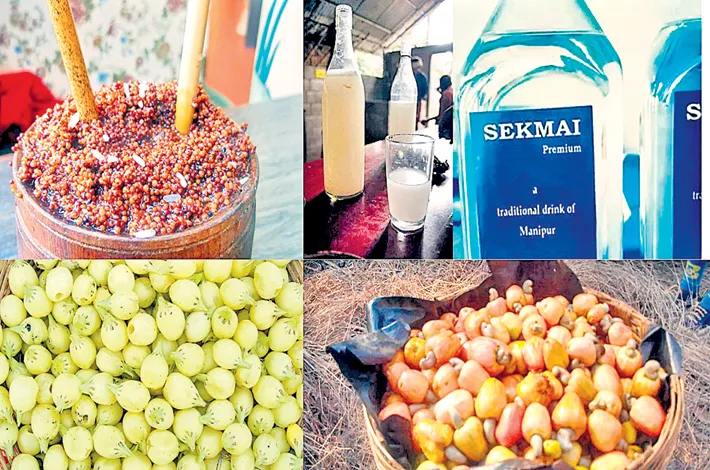Telangana Explores Fruit-Based Alcohol Production
18-08-2025 12:00:00 AM

Taste of innovation
- Exploring the production of mango-infused spirits and liqueurs
- Plans to make alcohol with malles (jasmine-inspired spirits)
Telangana is poised to make a significant leap in its thriving liquor industry with a new focus on fruit-based alcohol production, a move that could transform the state’s agricultural and economic landscape. Authorities in the state are actively reviewing licensing rules to facilitate the production of innovative alcoholic beverages derived from local fruits like mangoes and malles (jasmine-inspired spirits), aiming to capitalize on growing consumer demand and bolster rural economies. This development comes as Telangana continues to lead the country in alcohol consumption and revenue generation, with the state’s liquor market projected to reach Rs 30,000 crore annually in 2025-26.
The initiative to produce fruit-based alcohol is driven by Telangana’s rich agricultural heritage, particularly its abundance of tropical fruits. Mangoes, a staple of the region, are at the forefront of this venture, with distilleries exploring the production of mango-infused spirits and liqueurs. The state’s Excise Department is working closely with agricultural boards to ensure that farmers benefit directly from this new market. By creating a steady demand for fruits like mangoes, grapes, and other local produce, the government aims to provide farmers with a stable income source, reducing reliance on traditional crops and mitigating the impact of market fluctuations. This aligns with Telangana’s broader liquor policy, which has already proven to be a significant driver of economic growth, contributing ₹26.6 thousand crore in alcohol tax revenue in 2021 alone.
Industry experts see this as a strategic move to diversify Telangana’s booming alcohol sector, which is already one of the largest in India. The state’s liquor market is highly competitive, with 59 companies recently applying to introduce nearly 150 new beer and Indian-made foreign liquor (IMFL) brands. The addition of fruit-based alcohols could further enhance Telangana’s appeal, particularly in the premium and craft beverage segments. “Fruit-based spirits like mango gin or grape brandy could attract younger consumers and tourists, tapping into the growing trend of craft alcohol,” said Anil Kumar, a Hyderabad-based beverage industry consultant. The state is also exploring the establishment of microbreweries, which could incorporate fruit-based flavors, further expanding the market.
The push for fruit-based alcohol is not without challenges. Regulatory hurdles remain, as the Excise Department is revising licensing frameworks to ensure quality control and compliance with safety standards. Recent incidents, such as the bust of a fake alcohol racket in Suryapet district, where 178 counterfeit liquor brands were seized, highlight the need for stringent oversight. Authorities are keen to prevent illicit trade, which could undermine the credibility of new fruit-based products. The government is also mindful of public health concerns, with health experts warning that Telangana’s high per capita alcohol consumption—₹1,623 in 2022-23, the highest in India—could exacerbate alcohol-related health issues if not regulated responsibly.
Socially, the initiative has sparked mixed reactions. While some see it as an opportunity to empower farmers and create jobs, others are concerned about the cultural implications of promoting alcohol consumption. A recent incident involving Muslim fruit sellers in Telangana being coerced into drinking alcohol by a right-wing group has raised questions about the social dynamics surrounding alcohol in the state. Community leaders are calling for sensitivity in how new alcohol products are marketed to avoid exacerbating social tensions.
The Telangana government is optimistic about the economic potential of fruit-based alcohol. With an estimated 43% of men and 11% of women in the state consuming alcohol, the market for innovative beverages is robust. The state’s liquor policy has already created 11,000 jobs through 2,217 retail outlets, and the addition of fruit-based alcohol could further boost employment in agriculture, hospitality, and tourism. Plans to extend liquor outlet hours during festive seasons, such as New Year, indicate the government’s intent to maximize revenue, with sales expected to hit ₹1,000 crore in the last five days of 2024 alone.
As Telangana pioneers this fruit-based alcohol venture, it aims to set a national benchmark for balancing economic growth with responsible consumption. By leveraging its agricultural strengths and addressing regulatory challenges, the state is poised to redefine its liquor industry, offering a taste of innovation with every sip.








